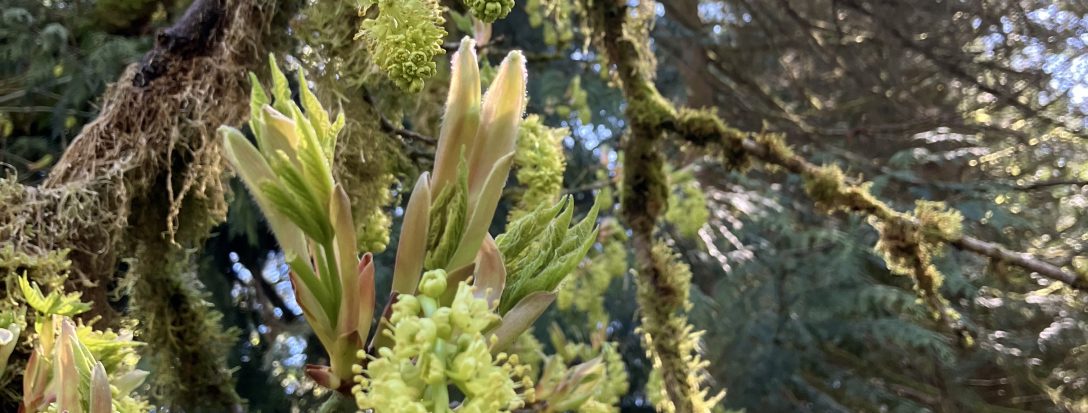Deaths on the farm are always lessons which stick, deep in my gut. Could I have made a change? Yes, and I will now. Did I know better? Yes, and the consequence makes it count. Guilt is natural, but not consuming. This mistake will not happen in this way again, but there will be more hard lessons, that’s life.
This morning was sunny, bright, and cool. The rain before dawn was soaked in, with beautiful diamond dew drops covering every surface. It’s one of my favorite sights here in The Pacific Northwest; forest glimmers, pasture lush with water and green. The lambs leaped into freedom, their wary mother’s braking away as ewes do, forming an undulating mass of herd momentum up the hill. My hens looked fat, plump little birds so generous with their labors. Both on the soil and in the next box; truly, this animal is indispensable to agricultural restoration.
The goats cry out in painful screams for breakfast. I usually feed them last, as they are on the far end of the stall block. I’d taken my time with the sheep, moving fencing into an upper pasture. As I walked back down to the barn, it was tempting to ignore the goats, become frustrated with their nagging, but it was also a pleasure to know they were soon to be fed, and that their hard work in bramble removal was priceless.
Though sunny and nice out, I had already decided to leave them in. Brawnwin, my youngest doe, was expecting her first kids, and had, along with the rest of the herd, not wanted to leave the comforts of the barn. This is typical goat behavior, and I was in no mood that morning to force her and the others on a long march to the far field, where they were currently working. It was a win win, with food and fresh water just a step away. So I threw hay, looked for eggs, and then spotted the horror in the corner of the stall.
Two wet lumps lay motionless in a bed of straw. It was the kids. I could tell from where I stood that they were dead, the realization crushed me. Running around to the door of the stall, thinking they might have just dropped and need support, my mind was racing through solutions. The dry towels in the grain room, a heat lamp, the colostrum formula- then I saw the third little body, under the manger, and my heart sank. It was the oldest, a larger black mass, who she had been able to dry off. It was cold and stiff. As I gently lifted it, I knew all three were lost.
It’s the farmer’s fault, always, and anyone trying to say otherwise has not kept livestock. Without direct human care, feeding, watering, and healthy living environment, death will occur. So what went wrong? Where did I screw up? Usually, a mother to be in the ungulate family of domestics, like sheep and goats, should be given a separate space to birth in. I know this, and was practicing it diligently with my sheep already, who have been lambing for over a month. I knew my goat was pregnant, but had not been closely watching her progress.
First timers often struggle with birth, and can sometimes abandon their new offspring in confusion. Also, social dynamics in the herd can overshadow any mother baby bond. In this case, the dominate two does in the stall were probably upset by the new kids, and butted them around till they were dead. That was the evidence I soon confirmed with more handling of the little bodies. shattered bones and pulverized internal organs, a signature of death by ramming. What hell, and I had let it happen through neglect. It was a mistake, and the gentler side of my conscience knows this, but the inaction was inexcusable too.
So, the solution- cull larger, older goats from the herd. Then stick to small goats, and keep breeding in that direction. A few years ago we lost a new breeding buck because of an injury sustained while sharing a stall with a larger wether (castrated male goat). It was another size related mistake I’ve made in mixing large and small breeds. They can breed, but struggle to live together safely.
Goats have played a huge role in reclaiming ground from blackberry invasion, as a key part of the restoration of forest and pasture at EEC Forest Stewardship. Most of the larger plants have been pulled down by large goats, leaving the landscape about knee height in most places the bramble still persists. Between sheep and dwarf goats, we’ll be able to stay ahead of it from now on.
By culling our large stock, we invite easier handling of our animals- smaller is lighter. My current lead doe can pull me off my feet if she catches me off balance. It’s impossible to ask farm sitters to handle her, or my other large doe safely, so it’s time to cull them. This will make a lot more stall room for the two smaller goats, and we can even invest in one more breeding doe, for a core herd of three, which is perfect for the farm needs. Best of all, the dwarf goats we will now be exclusively working with, cannot jump the electric fencing, and can be released into pastures without tethering. This also adds additional ease of handling, and better quality of life for everyone.
Even though this was a tragedy of mismanagement on my part, and I have paid the price three times over, the lessons will bring good change in the long term. My only hope is that I can keep learning, but in a way that does not cost lives any more. Again, it was my responsibility, and I failed, but I will not let this happen again, and I encourage others to learn what they can from my own failings, to prevent similar mishaps. This year we will have no kids, and have to cull two goats, including the one I’ve had the longest. It’s never easy to slaughter, but I’d never want someone else to do it for me.
Another covenant I keep with my stock is raising them, and slaughtering in a clean and humane way at the right time. This is something I think all stock owners should do, for it would make factory farming impossible, and raise the standards of care for our animals. It would also take most meat out of the gross consumption market, and demand more alternative convenience eating, preferably choices that do not involve animal lives on mass scale. When you support fast food- you embrace animal abuse, and worker abuse too. Please know where your meat comes from. If you choose to indulge, support local small farms. If you live in the Duvall area, and are seeking pasture raised lamb or goat, you can contact this farmer- escocrain@gmail.com. I sell live animals on the hoof, and can help you with slaughter and butchering to fill the freezer with clean, healthy, and humanely raised meat.


Thanks for following oneforestfragment. I really admire your work, and how you write about it in an honest and personal way. Thank-you also for sharing the loss of your baby goats, and sorry you had to learn that lesson the hard way.
LikeLike